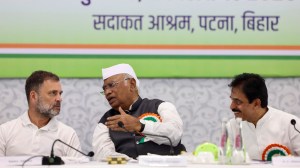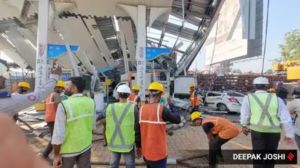Mother of all battles today to decide next govt
Elections 2004’s twists and turns, high drama and low intrigue have entered the last Act and, like any larger-than-life show, Monday pr...

Elections 2004’s twists and turns, high drama and low intrigue have entered the last Act and, like any larger-than-life show, Monday promises a nail-biting finale.
In recent weeks, the ‘make or break’ term may have been a little overused but the fourth and final phase of the elections tomorrow, accounting for 182 seats spread over 12 states and four Union territories, is really a cliff-hanger.
Its results will determine whether Atal Behari Vajapyee strides back to South Block on the strength of a clear majority or limps back with help from ‘‘smaller parties’’ if NDA falls short of the required 272 seats. Or, doesn’t get a chance to be sworn in India’s prime minister for the fourth time.
Tomorrow’s polls are of enormous importance to the BJP-led NDA alliance because it has to improve its 1999 performance when it won 84 of the 182 seats. Exit and opinion polls of the first three phases are near unanimous that the the NDA will fall short of a majority unless it does substantially better in Phase 4.
The Congress, on its part, is hoping that losses in Punjab and Madhya Pradesh will be offset by gains in every other state going to the polls tomorrow.
But the parties with the highest stake fall under the ‘Others’ category. Both Kerala and West Bengal will determine how much of a role the Left will play in the post-poll scenario. The last phase of polls in UP are also important for SP and BSP, crucial players in case the country is faced with a hung Parliament on May 13.
The Indian Express-NDTV poll after the three phases estimated that the NDA will get between 240-260 seats, well short of the magic 272. It can only hope to reach the half-way mark if it wins 92 seats in the last round.
Although the BJP put up a brave face today and expressed confidence of securing a majority, the party has reasons to be nervous. Given that the NDA did extremely well in many of the states going to the polls tomorrow, even equalling that record is tough; bettering it is a very tall order indeed.
Of the 12 states where elections are being held, the ‘‘mother of electoral suspense’’ takes place in Jayalalithaa land. Of the 39 seats in Tamil Nadu, the BJP together with its allies DMK, MDMK, PMK et al won 26 seats last time and the Congress-AIADMK alliance only 12.
Congress is now part of the DMK-led Democratic Progressive Alliance (DPA) which, according to most reports, is posing a formidable challenge to the AIADMK-BJP combine.
The BJP’s hope is centred around Tamil Nadu. If the BJP-AIADMK alliance manages to hold its own, the chances of reaching 272 or near about that figure increase. Otherwise, it’s a tough call.
The reason why Tamil Nadu is crucial is that in the two other big states, Kerala and West Bengal, the NDA alliance has very little chance of making a killing.
In West Bengal, the BJP-Trinamool alliance will be lucky to retain its 1999 tally of 10 seats. In Kerala, if the BJP manages to open its account for the first time, it will be a psychological morale booster but means little in the numbers game.
The other states where the BJP can hope to improve its performance are Uttar Pradesh (where it won six of the 18 seats going to the polls tomorrow, and is hoping that its ‘‘divide Muslim vote’’ tactic will pay rich dividends) and Punjab (where the BJP and allies won just three of the 13 seats in 1999).
The BJP also did extremely well in Madhya Pradesh in 1999, having won 12 of the 17 seats where elections take place tomorrow. But, high on the December Assembly election sweep and buoyed by exit poll results for the first phase of MP polls, the BJP is claiming that it will win all 17 seats this time.
This is where the party’s hope run ends. In almost all other states, the BJP did phenomenally well in 1999: it swept all seven seats in Delhi, all four in Himachal Pradesh, four out of five in Uttaranchal, and all 10 (in alliance with INLD) in Haryana. Even the most optimistic assessment does not indicate a repeat performance in these states.
Photos


- 01
- 02
- 03
- 04
- 05





























